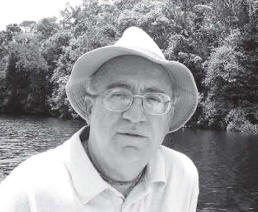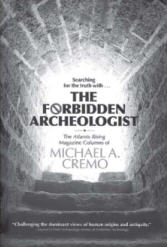Spiritual Scientist
Dr. Michael Cremo, aka Drutakarma Dasa whose books have sold over 300,000 copies in 26 languages is a well-known scientist. His global fame stems from his classic book Forbidden Archeology, which was hailed as “one of the landmark intellectual achievements of the late twentieth century.”

Born on 15 July 1948 in New York, USA, he had an in born literary inclination. He also had an innate passion for the truth that inspired him in his teenage years to go to India on a search for truth. Though he couldn’t make it to India then, the best of India came to him in America in the form of ISKCON in 1973. Thereafter he integrated his literary and spiritual interests by sharing Krishna consciousness through writing and editing. In addition to serving as an associate editor for Back to Godhead for over three decades, he has also co-authored several books published by the Bhaktivedanta Book Trust (BBT) including The Higher Taste, Chant and Be Happy, Divine Nature, and Coming Back. In the 1980’s, on repeated reading of Srila Prabhupada’s books, he felt impelled to fulfill his spiritual master’s desire to counter atheism masquerading as science and scientifically present the theistic worldview explained in the Vedic literature of ancient India. After co-authoring the Origins magazine with Dr. Richard L. Thompson (Sadaputa Dasa) in 1984, he continued the teamwork for nearly a decade of extensive research to publish in 1993 the encyclopedic classic Forbidden Archeology, which documented heaps of evidence that directly disproved the atheistic Darwinian theory of evolution. The book became a controversial bestseller, which led to the author being highly praised as an archeological detective who has “opened the locked doors of humanity’s history,” and despised as a pseudo-scientist whose books “do not deserve to be taken seriously by anyone but a fool.” Never one to miss an opportunity to drive home his message, Dr. Cremo brilliantly used the controversy raised by his first book to author a second book, Forbidden Archeology’s Impact, in 1998 which he demonstrated in action the very process of “knowledge filtration” that he had pointed out in his previous book. In 1999, he released an abridged version of Forbidden Archeology, called the Hidden History of the Human Race, which was translated into twenty different languages. In 2003, he published Human Devolution: A Vedic Alternative to Darwinian Evolution, which presented the Vedic understanding that human beings are comprised of not just matter, but matter, mind and consciousness and that human beings have not evolved from monkeys, but have “devolved” or descended from the spiritual realm. Dr. Cremo, who holds a doctorate in Vaishnava Theology and Science, is a member of many reputed global scientific forums, has presented dozens of research papers at prestigious international conferences and has delivered hundreds of lectures at universities all over the world. On the occasion of the release of his latest book The Forbidden Archeologist and his upcoming tour of India in February, we present here an interview with Dr. Michael Cremo. The interview was taken by BTG editorial consultant, Caitanya Carana Dasa.
1. When modern science and technology has made such tremendous leaps in progress, what can the Vedic texts of ancient India contribute to science in particular and to society at large?
When modern science began to develop in Europe a few centuries ago, influential scientists made a decision to exclude the subtle material (mental, mystical) and spiritual aspects of reality (the soul and God) from their work. They decided to focus on ordinary matter. This was productive for science. By focusing on ordinary matter, and how it operated predictably according to mathematically describable laws, science made tremendous advancement in its ability to control matter. This led to the development of many useful technologies. Scientists gradually extended their attempts to understand and control matter from the realm of physics to the realm of biology. This led to theories that human beings are just complex machines made of matter. These theories claimed that not only are we machines made of matter, but we are machines made of matter in competition with each other for survival. So we have achieved a lot of material progress, but at a tremendous cost to human welfare. We now tend to think that the most important purpose of human life is to produce and consume more and more material things. We are doing that, but in doing so, we are destroying the environment. We are poisoning the air, poisoning the land, poisoning the water. Also, human society is involved in intense competition for the control of material resources and wealth. There is conflict among individuals, classes, nations, and even religions. In this conflict and competition for material wealth and resources, some act in unfair ways to get more than their fair share. This is the root of the world’s current financial crisis. I believe the root cause of this is divorcing our understanding of matter from its connection with the spiritual. The Vedic literature offers a more balanced and complete picture of reality, with an understanding of matter integrated with an understanding of spirit. The Vedanta-sutra says aham brahmasmi: “I am spirit.” So ultimately we are all beings of pure consciousness, all coming from the same source, and all related to each other. The Vedanta-sutra also says janmadyasya yatah: “Everything is ultimately coming from a spiritual source.” If these things were understood, we would be able to keep our use of the earth’s material resources within sustainable, environmentally healthy limits. If we understood we are all coming from the same source, we are all part of the same spiritual family, there would be less conflict and violence in the world, and a fairer distribution of the earth’s resources.
2. Is being both a scientist and a spiritualist not self-contradictory? How do you integrate these two roles?
I see myself as a human being looking for truth. And I accept truth wherever I find it, be it in science or spirituality. For me, a real science includes spirituality, and a real spirituality is a science. Einstein famously said, “Science without religion is lame, religion without science is blind.” A real science should deal with everything that is possibly true about reality. There should not be artificial rules that scientists cannot take the soul and God into account in their work. Such decisions should be up to each individual scientist to make. And if we look at the history of science, we see that many of the greatest scientists did so. And as for religion, it should not be just a set of blind rituals. It should be scientific in the sense that if you perform certain activities you should get a definite observable result. This is what I find so attractive about yoga. In its purest form, it is a science for the transformation of consciousness. And if you do the experiment, you get an observable result.
3. ISKCON being a spiritual organization, what role does science play in it and how does a scientist like you fit into it?
The founder-acarya of ISKCON, my guru, His Divine Grace A. C. Bhaktivedanta Swami Prabhupada, wrote in his commentary on the Srimad-Bhagavatam (1.5.22): “Advanced people are eager to understand the Absolute Truth through the medium of science, and therefore a great scientist should endeavor to prove the existence of the Lord on a scientific basis.” For this purpose, in 1974 he established the Bhaktivedanta Institute. I began my association with Bhaktivedanta Institute in 1984. Since that time, I have been engaged in scientific work, writing scientific books like Forbidden Archeology and Human Devolution: A Vedic Alternative to Darwin’s Theory. These books present a version of human origins consistent with the accounts found in the Vedic literature. The system of spirituality practiced in ISKCON is bhakti-yoga,the yoga of devotion. A big part of bhakti-yoga is using one’s talents and abilities in the service of the Lord. For example, Arjuna was a warrior, and he used his abilities in the service of the Lord during the battle of Kurukshetra. In the same way, I am using my intellectual abilities for the service of the Lord. So my work is part of my yoga.
4. As an American scientist who is also a scholar in India’s ancient texts, what message would you like to give to Indians?

The ancient texts of India, like the Vedas, Upanisads, and Puranas, contain insights that can help science gain a better picture of reality, one that properly balances the material and spiritual. Of course, in the world of science, it is not enough to just give some quotes from the scriptures. One has to present evidence that is consistent with the principles of the ancient texts. The most essential insight given in the Vedic literature is that life does not come from matter. Life comes from life. We are spiritual beings with spiritual needs, not simply machines made of matter with exclusively material needs. I am not saying we should ignore the material side of life. But we need to restore a proper balance. For example, if someone eats too much of the wrong kinds of food, one will become overweight and diseased. The solution is not to stop eating. The solution is to eat the right amounts of the right kinds of food. So today human society is too materialistic, and we are suffering the results. The insights from the ancient texts of India can help restore a proper balance to human life on this planet. We can learn how to satisfy our material needs in the most simple, natural and efficient way possible, while putting most of our human energy into developing our spiritual consciousness. The Vedanta-sutra says athato brahma jijnasa. We should inquire about and develop our spiritual nature. Of course, anyone can do this individually, but it would be better if whole societies were arranged to facilitate this. Ancient Indian society was arranged to facilitate such development of one’s spiritual nature, and that social arrangement continues to some extent even to this date. Nowadays many Indians being enamored by the West are neglecting or rejecting their traditional wisdom and culture, and thus losing the spiritual enrichment that it can offer. If Indians would study open-mindedly their own spiritual legacy and empower themselves with its spiritual practices, then they can not only restore their country to its lost greatness, but can make India a global spiritual superpower. ISKCON, by its systematic presentation of philosophy and culture, is offering Indians this opportunity to rediscover their lost glory.
The Forbidden Archeologist is available through Amazon.com and all good book stores from 9 November. For information about upcoming bookstore signings and radio appearances, please also visit http://www.mcremo.com/
